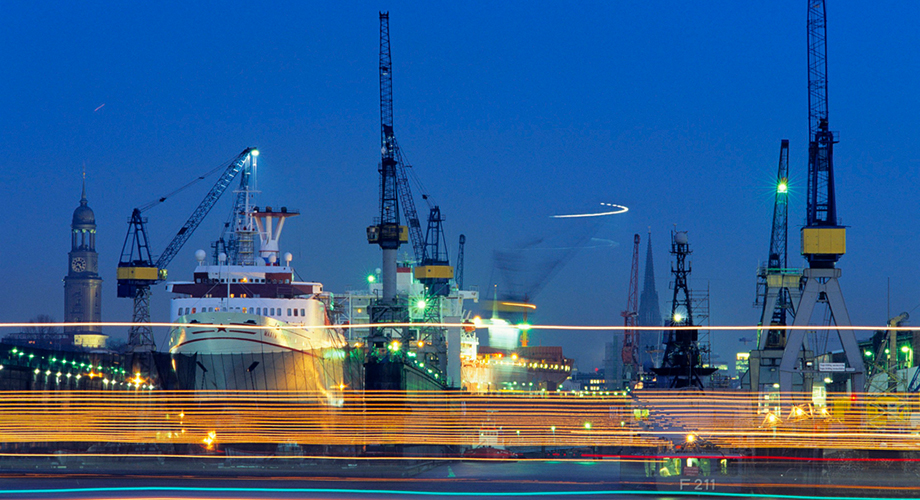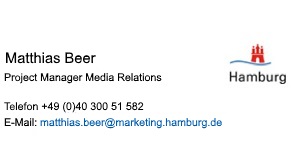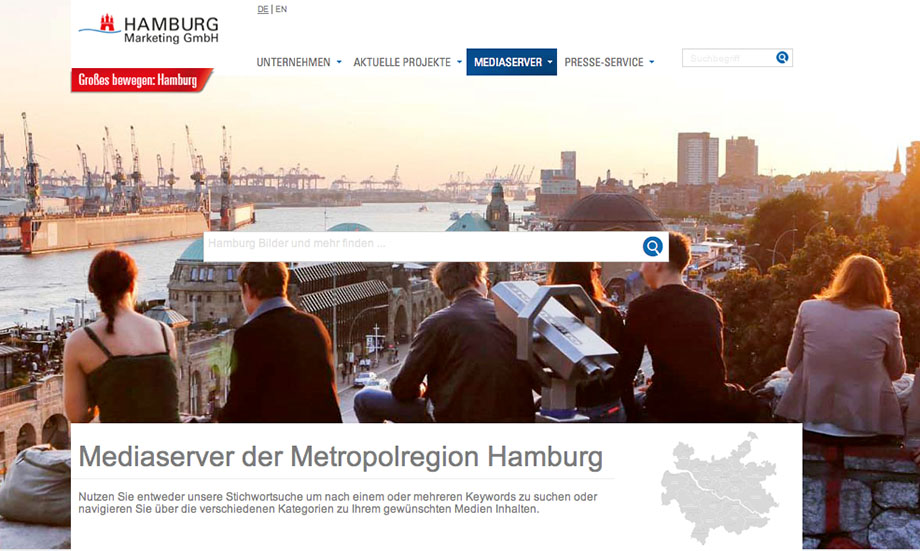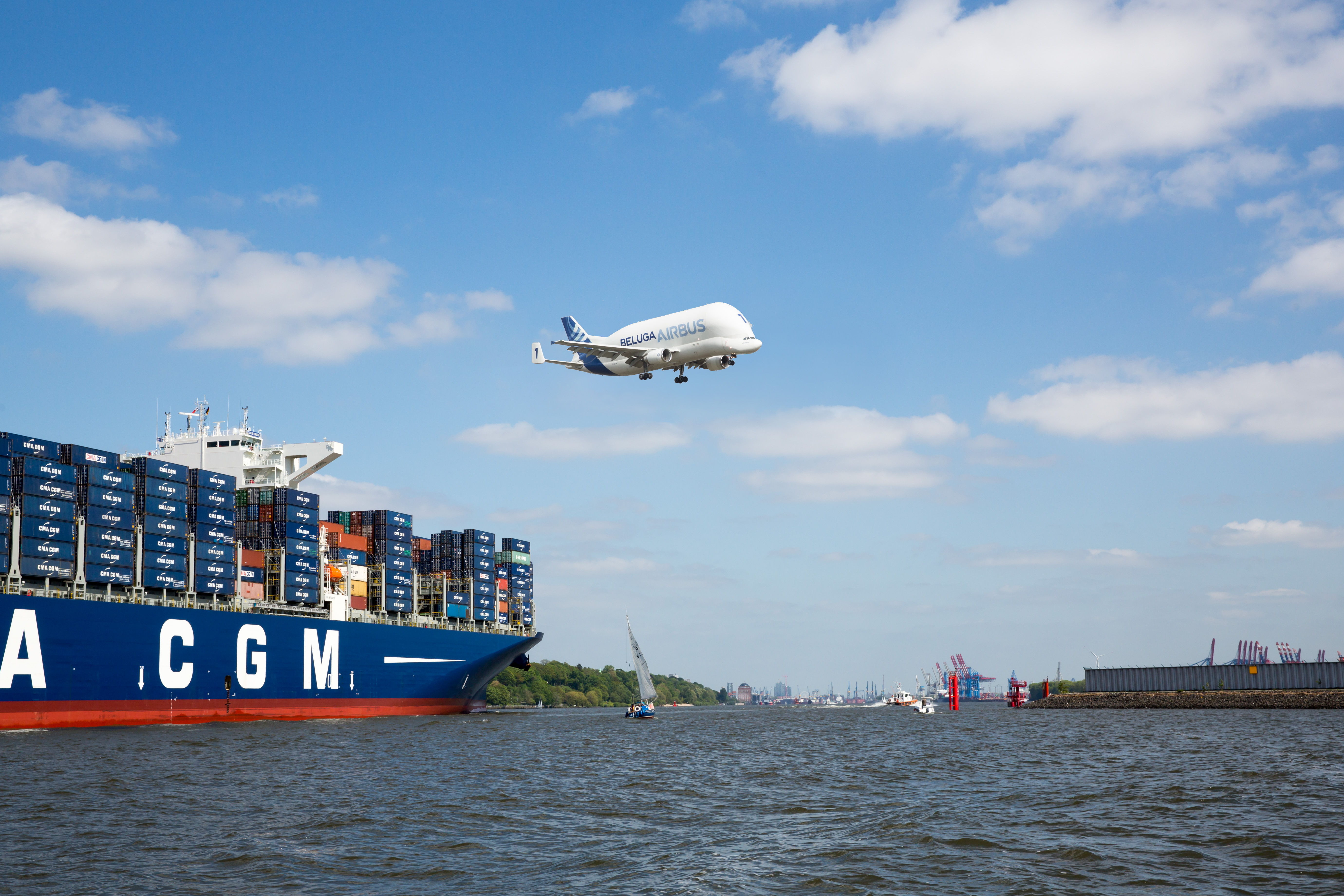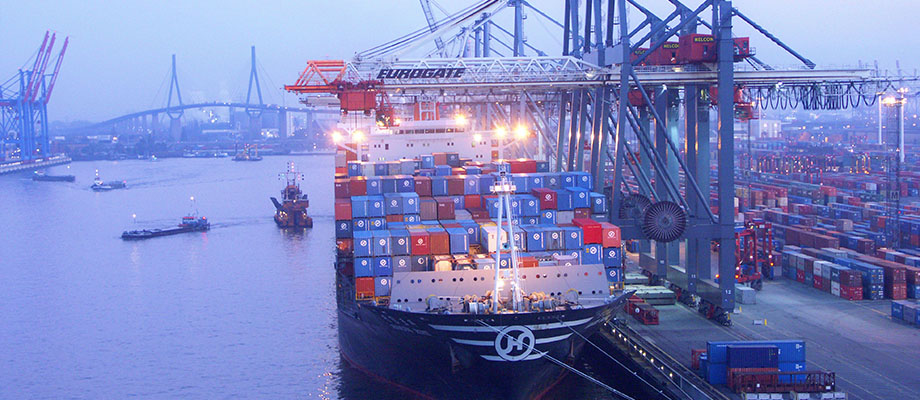Cruise Industry and Green Shipping as Maritime Innovation Drivers
The maritime industry is one of Hamburg’s key economic factors. Today, shipbuilding companies and suppliers are faced with new challenges due to higher environmental standards and increasingly discerning clients. A pronounced trend towards specialisation strengthens Hamburg as a business and research location.
It is always impressive to watch a large passenger ship such as the “Queen Mary 2” being manoeuvered into the Elbe fairway and being docked with the highest precision at the “Elbe 17” dry dock situated in the Blohm + Voss shipyard. All this can be observed from the St Pauli Landungsbrücken in the heart of Hamburg’s city centre. For spectators on the shipping pier on the northern bank of the Elbe, the ship’s stern is almost within reach during such manoeuvres. “Elbe 17” is one of the largest dry docks in Europe and can accommodate the longest and most magnificent ships. Not only the “Queen Mary 2”, but also the “Queen Elizabeth” and the “Queen Victoria” come to Hamburg at regular intervals to be serviced by this traditional shipyard. In late 2014, the “Queen Victoria” was equipped with two new exhaust gas washer systems, known as scrubbers, as well as three exhaust filters at the shipyard. Established in 1877, Blohm + Voss is one Germany’s last large-scale shipyards. Service and repair contracts are an important economic pillar for the Blohm + Voss shipyard, which is located in the very heart of Hamburg’s port. And business is booming: the Carnival Corporation, the world’s biggest cruise shipping company, is having its entire European fleet modernised and repaired by Blohm + Voss. The US shipping group includes e.g. the “three queens” of Cunard Line, the club ships of Aida Cruises, as well as the cruise liners operated by Costa Cruises and P&O Cruises.
“Shipbuilding in Germany has changed considerably in recent decades and is facing new challenges,” says Jessica Werner, head of the Hamburg office of the Maritime Cluster Northern Germany. In this transregional network, players from the maritime industries and maritime sciences have joined forces in order to strengthen competitiveness and innovation across all industry sectors. “For many years, Germany’s maritime industry placed a strong focus on the construction of container ships. However, since the onset of the global economic and financial crisis, a pronounced trend towards specialisation can be observed,” says Ms Werner with reference to the construction of large cruise ships at Meyer Werft, a north German shipyard. Suppliers are also benefitting from this development. Thus SAM Electronics GmbH, a Hamburg-based company, designs specialised navigation and monitoring systems for vessels, and the Amptown Systems Company provides multimedia technology solutions for the entertainment areas of passenger ships, such as theatres, cinemas and bars. “The products of German shipbuilding suppliers are characterised by excellent quality and high reliability,” Jessica Werner confirms.
The Sietas shipyard may serve as another example for specialisation in the shipbuilding industry. Founded in 1635, it is one of the oldest works in Hamburg. Sietas used to specialise in the construction of small and medium-sized container ships. When, in 2009, demand decreased significantly as a result of the financial crisis, Sietas started focussing on niches in specialised shipbuilding. In 2010, the shipyard was commissioned to build the first German wind turbine installation vessel for offshore wind farms. As a result of difficult economic conditions, Sietas had to file for insolvency in 2011. With the Pella Shipyard group from Hamburg's twin city of St Petersburg as its new partner, Sietas is now aiming to emerge from the crisis with new strength.
In demand: special ships and mega yachts
Blohm + Voss, too, does not solely rely on service orders from the cruise industry and commercial shipping: the shipyard also builds special vessels for oil and gas extraction, and the construction of exclusive super yachts is another mainstay of this traditional shipbuilder. Thus e.g. Russian billionaire Roman Abramovich had his mega yacht “Eclipse” built at the Blohm + Voss shipyard. The yacht includes a total of nine decks, a theatre, a nightclub, and a swimming pool, as well as two helicopter pads, 20 jet skis and four motor boats. For Blohm + Voss, the unique and complex requirements of discerning clients represent new challenges, as these requirements place special demands on the construction and equipment of such super yachts. Most recently, the yacht “Graceful”, which was delivered in 2014, comprises an indoor pool that can be converted into a dancefloor by raising the pool bottom. While Blohm + Voss are reluctant to disclose clients’ names for such super yachts, word has it that the “Graceful” was commissioned by president Vladimir Putin.
The shipbuilding sector alone employs nearly 15,000 people in Northern Germany, and the sector’s total turnover amounted to approximately 4.7 billion euro in 2013. Hamburg’s shipyards can make use of a broad and innovative range of research and training sites for maritime research. The Hamburg University of Technology (TUHH), for instance, comprises twelve different institutes dedicated to research into maritime systems, with the aim of increasing the efficiency and safety of ships. The Hamburg) was established more than 100 years ago. The institute tests the latest hull types for their hydro-mechanical properties and analyses their manoeuverability in a 300 metre-long test pool even under rough sea conditions. The HSVA’s premises also include one of the world's largest ice tanks, which is used for testing ship models in particularly complex simulations in extreme climate scenarios.
The maritime industry spans the entire value chain
Hamburg is also home to the maritime headquarters of the classification society DNV GL. The company, which emerged in 2013 from the merger of Det Norske Veritas and Germanische Lloyd, certifies new constructions and monitors compliance with international safety and environmental standards. As well as advising shipping companies in terms of enhancing efficiency, the DNV GL’s engineers also develop concepts for future propulsion systems. The Fraunhofer Center for Maritime Logistics and Services (CML), which was founded in 2010 onsite the TUHH campus, develops and optimises processes and systems along the maritime industry’s supply chain. The CML designs digital solutions in the field of ship & information management to support various decision-making processes in the maritime industry. In addition, the CML also coordinates the pan-European research project MUNIN, which aims to examine the potential of and requirements for unmanned navigation.
Environmental protection leads to image transformation
“The Hamburg Metropolitan Region is a major centre for the maritime industries,” Jessica Werner further explains. In addition to the region’s shipyards and shipping companies, it also includes scientific, research and educational institutions, as well as marine engineering institutes, maritime service providers, the offshore industry and port authorities. “Hamburg has a particularly strong mix of industries. Especially in the maritime sector, large companies tend to have an excellent network due to their long tradition, and many companies and associations have their headquarters directly on the Elbe. This means that many important decisions are being made in Hamburg,” Ms Werner adds. According to Ms Werner, there is hardly any other location in Germany with such a high density of maritime knowledge.
This high density of knowledge is confirmed by the large number of maritime conferences and events hosted in Hamburg. Every two years, stakeholders from the maritime industry gather in Hamburg for the SMM, the world’s leading trade fair for the maritime industries. In 2014, more than 2,100 exhibitors on a 90,000m2 exhibition area attracted some 50,000 trade visitors from all over the world. Environmental protection and an increase in efficiency are among the SMM’s core topics. Since 2015, only ship fuels with a sulfur content of 0.1% may be used in European coastal waters. What is more, the International Maritime Organization (IMO) has tightened up its efficiency requirements in an effort to further decrease ships’ fuel consumption and greenhouse gas emissions.
These provisions call people like Dirk Lehmann into action, who is managing director of Becker Marine Systems. Located in the south of Hamburg, Becker Marine Systems develops innovative ideas for green shipping. With its high-performance steering systems for mega yachts, large tankers and container ships, the company is the global market leader in the segment. To enhance environmental protection in the shipping industry, the company has designed energy-saving solutions for ship propulsion. More recently, the company demonstrated its innovative strength with its LNG concept: in collaboration with the cruise company Aida Cruises, Becker Marine Systems has developed a floating power station for ships that uses liquefied natural gas (LNG). Since 2015, this new LNG Barge supplies electricity to cruise liners that are moored in the port of Hamburg whenever there is no access to on-shore power supply. Thanks to the LNG Barge, giant cruise ships can now refrain from using their own diesel generators in the middle of the city centre, which will sustainably reduce pollutant emissions. “The LNG Hybrid Barge will contribute to considerably increasing air quality in Hamburg,” explains Mr Lehmann, whose team has further developed the LNG concept by adding a hybrid drive and now aims to also equip ferries with eco-friendly power supply.
Blohm+Voss has a history of nearly 140 years and is one of the last remaining large-scale shipyards in Hamburg. In recent years, Blohm+Voss’s core business field of ship newbuilding has become more and more specialised. Today, the company employs a team of approx. 1100 experts in the four business units Mega Yachts, Ship Services, Production Services and Power Plant + Marine Services. The shipyard specializes in the execution of complex projects in yacht new builds as well as in repairs, conversions, upgrades and maintenance of passenger vessel, offshore units for the oil and gas industry, naval vessel and merchant vessels. In this business areas the company convinces with sustainable, innovative technologies.
Facts:
- last large-scale shipyard in the port of Hamburg, including the “Elbe 17“ dry dock
- specialised in the construction and build of builds customized and individually designed mega yachts starting at a length of 80 meters
- refit, modernization for passenger vessels, offshore units for the oil and gas industry, naval vessels and merchant vessels
Contact:
Blohm+Voss GmbH
Hermann-Blohm-Strasse 3
D-20457 Hamburg
Michael Brasse, Corporate Communications, phone: +49 40 311 914 86
At the Hamburg Ship Model Basin (HSVA) ship designers from around the world can test new models of hull types under various conditions. The HSVA is the ideal partner when it comes to optimising new ships in terms of hydrodynamics. The research institute was founded in 1913 and also comprises a model workshop, where more than 5,000 ship models have been built to date. Ship models can be tested in a 300 metre-long towing tank that generates waves and analyses fluid flows around a ship hull.
Facts:
- 300 metre-long towing tank for testing ship models
- ice tank simulating the navigational behaviour of ship models under arctic conditions
- hydrodynamics and cavitation tunnel for measuring fluid flows around the hull and for cavitation tests on a model propeller
Contact:
Hamburg Ship Model Basin (HSVA)
Bramfelder Strasse 164, D-22305 Hamburg
Dr. Janou Hennig, Managing Director, phone: +49 40 692 032 16
The Hamburg-based company Becker Marine Systems GmbH specialises in designing energy-saving solutions for ship propulsion. With its high-performance rudder systems, the company is the global leader in the segment. With its LNG concept, the company aims to establish low-emission fuel in shipping. Since 2015, a floating power station in Hamburg’s port supplies cruise ships with electricity generated from liquefied natural gas. The LNG Barge helps reduce emissions in the city centre, as cruise ships can now refrain from using their diesel generators for power generation. In future, Becker Marine Systems also aims to equip other types of ships with an eco-friendly LNG hybrid drive.
Facts:
- efficientrudder systemsreduce the fuelconsumption oflarge shipsby 3%
- reduction of NOx and CO2 emissions
- LNG-powered barge supplying cruise ships in Hamburg’s port with green electricity
Contact:
Becker Marine Systems GmbH & Co. KG
Blohmstrasse 23, D-21079 Hamburg
Chris Lehmann, PR Manager, envise OHG, phone: +49 40 300 928 80
